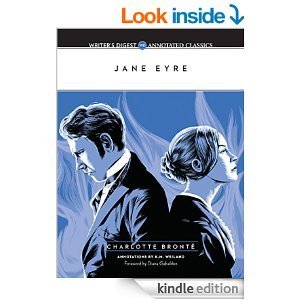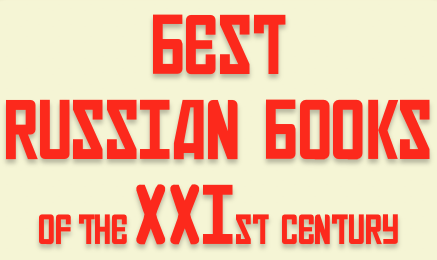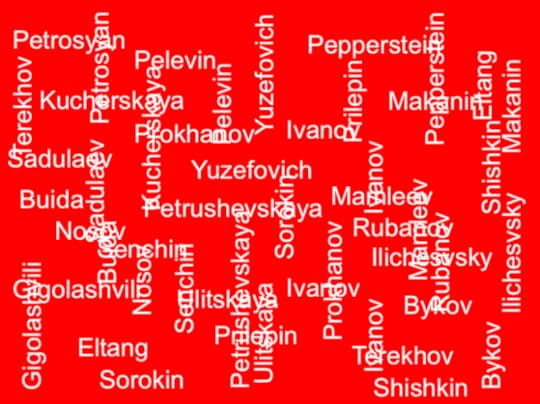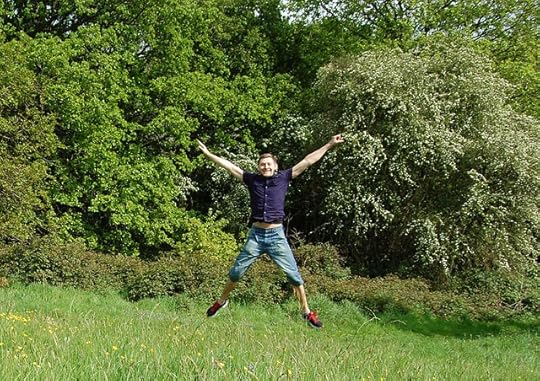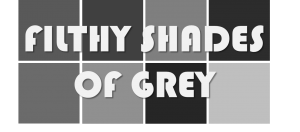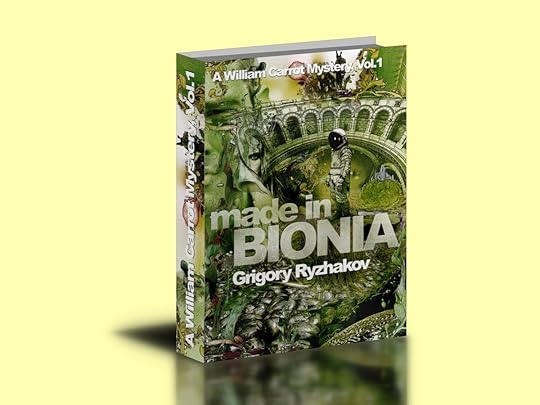Grigory Ryzhakov's Blog, page 4
August 8, 2014
Guardians of the Galaxy, Frozen and Rise of the Weird
I’ve been telling everyone for months before releases of Frozen and Guardians of the Galaxy that they’re going to become box office hits.
Okay, we can deconstruct their success now and say that these stories are well produced, have the right character arcs, story structure, plot progression, amazing attention to detail, but one thing I’ve spotted in them that makes spectators absolutely crazy about these flicks is the weird funny character.
http://www.youtube.com/watch?v=D9aXaAHJkKA
Captain Jack Sparrow in The Pirates of the Caribbean, the snowman Olaf in Frozen. There are not many films that feature such character, but when inserted into a big screen blockbuster it provides much-desired comic relief.
What could be inherent qualities of the successful weird character? My list here:
kind and innocent like a child
selfish yet loyal to the point of self-sacrifice (when nearly all is lost)
not very bright yet wise
unexpectedly resourceful
funny, funny, very funny
eccentric or out-of-this-world
This character won’t be just providing laughs, he would move the plot and will make a critical contribution to the thematic climax of the story. Fellow writers, take notes. Your weird character may not have all these qualities, but the more of them the better.
For instance, Jack Sparrow is far from being innocent, but hey, he’s a pirate.
http://www.youtube.com/watch?v=u7Z8M_PJ8ac
Now, the film Guardians of the Galaxy enjoys an overall impressive cast, yet it is the genetically modified racoon Rocket and his friend, a walking tree called Groot (who predates even Marvel itself), who steal the show. Especially Groot, who virtually ticks all the boxes. Groot only knows one phrase, he(or it) is mostly quiet in comparison to his chatty ‘know-it-all’ pal Rocket. The duo works so well. An animal and a plant. Super cute.
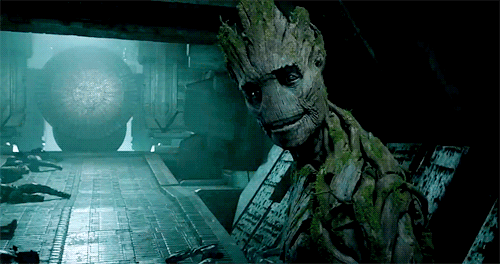
I AM GROOT
Then, we notice that Groot is not as dumb as we think. He keeps saving everyone’s asses all the time, including the epic grand finale. Without assisting to spoilers, I’ll just say that the very nature of Groot makes him incredibly resourceful and gives the required foreshadowing to the final plot twist. While Quill is their leader, Groot is the definitely the soul of the Guardians’ team.
Go to see this film, it’s so Groot.
July 30, 2014
Learning from Bronte: Jane Eyre and Writing Craft
KM Weiland’s annotations of the classical masterpiece Jane Eyre are very timely. More than ever, scores of writers are getting published, and the modern reader is overwhelmed with reading choice. Yet, there’s always an issue of quality of the written word, and in our era of fast publishing this issue is especially obvious.
Over the past decade KM Weiland has been blogging on writing craft. She’s released brilliant craft books on character creation, outlining and the story structure. She often quotes passages from famous books to show use or misuse of a particular technique, and this annotated version of Jane Eyre is her first systematic attempt at making a craft book where all the techniques she’s been teaching are exemplified in one masterpiece. I say systematic, because this book can be used as a study material for writing courses.
Topics KM Weiland touches here are:
beginning and ending of the novel – hooks and the tone of writing.
character arc
three-act structure – plot points
scene structure (action and reaction, and more detailed scene mechanics)
plot progression through foreshadowing, the concept of a Lie, character arc
subplots and backstory
prose (use of symbolism, unique detail in description, subtext, sentence structure)
In her recent interview, KM Weiland mentioned that she wanted to focus on good things you can learn from this book rather than criticise Jane Eyre, which is the easiest way to alienate readers.
Personally, I think there are many elements in this novel that wouldn’t work well for modern writers. Yet, 200 years ago they were norm.
For instance, St John gives Jane a poetry book, and Jane Eyre suddenly spends a page mulling over poetry and literature, – the scene is disrupted. These philosophical pauses, bits of non-fiction, were common in novels in the old times, now they’ll just distract the reader.
Another thing genre writers should be aware of is coincidences. What is the chance of a wandering orphan randomly stumbling upon a remote house in the English countryside, where three people who reside there who turning out her cousins?
Back to KM Weiland. She does mention that certain techniques such as blatant foreshadowing or prose modified to show an unusual accent may backfire. Yet these remarks are by no means criticise the Jane Eyre novel, rather they highlight the evolution writing craft has undergone in the last couple of centuries.
If you want to take your writing to the next level and find out how the modern story craft works within a context of the classical read, you’ll find this book helpful. Also, studying the basics of story-telling from craft books by KM Weiland and James Scott Bell and reading this book would go along nicely. Thank you , Katie, for another great resource!
July 25, 2014
Best 100 Novels of the XXIst Century: Pt2 – Contemporary Russian Novels
Last week, I blogged about the Afisha’s list of Best XXIst Century novels, now I’ll conclude that post with a summary of contemporary Russian books that ended up on that list. Some of these books or other books written by the shortlisted authors are available in translation in English and other languages and I’ll underline and hyperlink them to websites where you can download them.
Kamlaev’s Anomaly by Sergey Samsonov
A poignant story of a renowned but troubled composer who tries to mend his broken inspiration and compose something great again, while at the same time rescue his wreck of a marriage. A truly inspirational and musical novel.
Asan by Vladimir Makanin
This intellectual, rhetorical novel is set in war-torn Chenchnya. Asan is a mythological Chechen deity of war and trade and in this novel it is the main protagonist Zhilin, who makes money on fuel trade, which inevitably requires him to act a middle-man in military disputes between Russian and locals.
The Librarian by Mikhail Yelizarov
Books by a third-rate Soviet author Gromov give the readers extraordinary powers, secret battles occur to own these rare books. The Librarian is a piece of vigorous, absurd prose and a bizarre portrait of Russia.
The Wandering Time by Yuri Mamleev
Yuri Mamleev is synonymous to metaphysical and psychedelic fiction in Russia. His literary techniques are a mix of classics and post-modernism and this book is about adventures of Moscow intelligentsia in the transition period of Russian history. Well, Russia is always in transition save for occasional zastoi. The works of Mamleev are still waiting to be widely translated. For now, his cult novel Shatuny, which is sometimes called the most terrifying book of all time, is now available in English.
Boutique Vanity by Alexandr Ilyanen
This lyrical diary’s owner talks about his walks in St Petersburg, a city of art and literature, and the surrounding area.
Return to Egypt by Vladimir Sharov
Sharov’s latest book, in which our contemporary Kolya Gogol completes writing Dead Souls. Oh! My! God!
Sunday In The Third Rome by Vladimir Mikushevich
A complex novel for connoisseurs of linguistics in fiction and adventures in Russian history, written by a Russian philosopher and translator. The main protagonist is a modern day philosopher-esoteric Platon Chudotvortsev (Plato the Wonder-maker) and a composite symbol of great Russian thinkers of the past.
The Horizontal State by Dmitry Danilov
A diary of a loser-writer in the modern day Russia. It feels like a blueprint hero of our time.
Mr Hexogen by Alexandr Prokhanov
The most scandalous Russian political novel of the new century. A must-read and a must-be-translated book. Never before Russian literature was so close to Kremlin’s politics.
The Rooks Have Gone by Sergey Nosov
An existential comedy about life, friendship, modern art with a spirit of St Petersburg all over it.
The House That… by Mariam Petrosyan
An orphanage for disabled children; some of them narrate this story. My favourite Russian book of the decade. I don’t envy the translators who will work on it; but if done well, this book would be talked about for ages.
The Road Back by Andrei Dmitriev
This novella depicts a travel of a Russian woman, symbolizing mother Russia, to a Pushkin festival.
Dondog by Antoine Volodine
Volodine is actually a French author with a Russian pen name, which counts for Russian in my books. Dondog is a story of a revolutionary returned from ‘camps’ to a grotesque Western city. Revenge is the plot; our troubled genocide-ridden past is the theme.
The Yeltyshevs by Roman Senchin
A story of a provincial family forced to move to the countryside and survive there.
‘The Eltyshevs is Robinson Crusoe back-to-front: the palpable debasement of the human spirit that loses at every level of the life surrounding it, the bankruptcy of individualism and initiative, the capitulation of man in the face of nature… It captures the mood of the era’ Lev Danilkin
Cranes and Dwarfs by Leonid Yuzefovich
In this novel the author of Harlequin’s Costume mints together several historical eras including the events of 1993 in Russia. A sophisticated and adventurous political satire.
The Big Green Tent by Ludmila Ulitskaya
An epic portrayal of the post-WWII Russia and the legacy of Stalinism. Stories of the interwoven lives of several Soviet families. Ulitskaya is the number one chronicler of the Soviet era.
The Gold of the Revolt by Alexei Ivanov
An entertaining, intelligent and exotic historical adventure or ethno-fantasy set in the XVII Russia. The interesting thing about Ivanov that he’s got a very broad audience and his books have rich plots and thus become true bestsellers. He’s one to watch. There’s a French translation of his other novel, The Geographer Drank His Globe Away.
Stone Maples by Lena Eltang
A rather European novel set in Wales, a pseudo-detective story about young witches.
The Stone Bridge by Alexandr Terekhov
‘Based on a true story, The Stone Bridge resurrects actual historical figures and brings to light official documents from NKVD case files. The book shines the spotlight on a past with which the country has never properly come to terms, and which therefore – tragically – has a poisonous effect on present-day Russia.’ Glagoslav Publications
The Book of Water by Eduard Limonov
A highly entertaining memoirs of one of the most controversial political activist, publicist and author in modern day Russia.
Baptised With Crosses by Eduard Kochergin
‘The memoirs of an old man who, as a boy, learnt to find his way between extortionate state control and marauding banditry, the two poles that characterize Russia to this day. A story about the awakening of artistic talent under highly unusual Russian circumstances.’ Glagoslav Publications
A complex intellectual novel about a physicist who falls in love with a homeless woman. Russian Booker Prize winner.
Blizzard by Vladimir Sorokin (to be translated into English soon)
Sorokin is of the most translated modern Russian masters; he’s famous for his highly stylised and shocking prose. This Blizzard is set in the future day Russia.
Laurus by Evgenii Vodolazkin (to be translated into English soon)
‘Laurus is a fable in the form of a biography. It tells of a late 15th century village healer is powerless to help his beloved, watching her die in childbirth, die in sin – unwed and without having received communion. The protagonist, a desperate man, sets out on an exhausting journey in search of redemption. On this journey of privation and hardship in the service of the people, a journey that spans ages and countries, the hero undergoes a painful personal transformation.’ Banke, Goumen and Smirnova
A Gloom Descends Upon The Ancient Steps by Aleksandr Chudakov
A memoir novel by a distinguished Russian philologist about people’s struggle with the Soviet state. The Russian Booker Prize of the decade.
Mythogenic Love of the Castes by Pavel Pepperstein
An epic and surreal novel on WWII events in Russia.
Number One by Ludmila Petrushevskaya
A metaphysical, scary fairy-tale by this world famous Russian playwright, singer songwriter and novellist. A ethnographer studies a small nation in the obscure part of Russia, then his soul re-populates a body, this time – of a criminal.
I Am All Ears by Anton Ponizovsky
What is this mysterious Russian soul? Did Dostoevsky have any right to be a moral authority? What makes a Russian different from any other person? Is it possible to reconstruct the essence of ‘Russianness’ from multiple life stories of Russian commoners?
Silent Souls by Denis Osokin
These stories featuring traditions of local people of the Volga region were adapted for the screen and the film was short-listed for the main prize at the Venice Film Festival. The film trailer is below.
http://www.youtube.com/watch?v=KwITu17zD6w
The Fiery Burial by Vladimir Nesterenko
A mystical thriller about a band of criminals travelling from Crimea to Moscow. The metaphysics of violence is a central theme of this author.
Orthography by Dmitry Bykov
An alternative history novel on post-revolutionary Petrograd (St Peterburg) in 1918 and tragic adventures of intelligentsia. Bykov is an extremely prolific publicist, novellist and poet, best known for his novel Living Souls.
The Light and The Dark by Mikhail Shishkin
‘“The Light and the Dark” is what the Russian title of the novel, “Letter-book,” promises more discreetly: a series of time-traveling letters between two lovers separated by war. The young woman, Sasha, writes from home; the man, Volodya, from the front. They discuss, somewhat wanderingly, what all lovers do: nothing and everything. Minutiae and grand philosophy collide on every page.’ Boris Fishman, NY Times Sunday Book Review
Dancing Till Dead by Valery Popov
A terrifyingly sincere novel on the writer’s view of the world being demolished with a harsh turn of fate. When life keeps slapping him harder and harder, only humour keeps him going.
Rumyantsev’s Square by Evgeny Voiskunovsky
The Russian XXth century – A panoramic view of Russia from the times of WWII to perestroika. This books needs to be re-discovered.
Do Time Get Time by Andrei Rubanov
Rogue businessman turned writer – this book is an autobiographical novel set in the wild 1990s in Russia. Rubanov is a very prolific mainstream author with a good sense of plot.
Sankya by Zakhar Prilepin
‘Sasha “Sankya” Tishin, and his friends are part of a generation stuck between eras. They don’t remember the Soviet Union, but they also don’t believe in the promise of opportunity for all in the corrupt, capitalistic new Russia. They belong to an extremist group that wants to build a better Russia by tearing down the existing one. Sasha, alternately thoughtful and naïve, violent and tender, dispassionate and romantic, hopeful and hopeless, is torn between the dying village of his youth and the soulless capital, where he and his friends stage rowdy protests and do battle with the police. When they go too far, Sasha finds himself testing the elemental force of the protest movement in Russia and in himself.’ Glagoslav Publications
Blue Blood by Yuri Buida
A Marquez-esque novel in the genre of magical realism portraying the life of a Russian XXth century actress Valentina Karavaeva (1920-1997).
Modern Patericon by Maya Kucherskaya
An interesting book about Russian experience of switching from the Soviet atheism to the Russian Orthodox Church tradition.
Flaner by Nikolai Kononov
War-torn Soviet Russia of the 1930-1940s. Adventures of a Polish man, an intellectual, who falls in love with another Polish man, a military officer.
The Devil’s Wheel by Mikhail Gigolashvili
In this multi-layered novel Gigolashvili portrays a horrific reality of Georgia (a former republic within the Soviet Union, located in the Caucasus) of the 1980s with its crime, corruption and violence.
I Am a Chechen by German Sadulaev
This book of visceral stories about horrors of the Chechen War of the 1990s made the author instantly famous in Russia.
The Darkness of Your Eyes by Ilya Masodov
A mocking and surreal story about a teenage vampire girl who travels to Black Moscow in order to raise Lenin from the dead. Delightful, ha ha, it’s beyond my understanding why this has not been translated yet.
The Sacred Book of the Werewolf by Victor Pelevin
Victor Pelevin is an unsurpassed Titan of political fiction in Russia. His prose can be described as psychedelic and postmodernist, metaphorical, allegorical, swarming with cultural references and religious and philosophical doctrines. At the same time, it’s often conversational and deceptively accessible. Yet, an unprepared reader would easily miss out on richly layered contextual and sub-textual meanings in Pelevin’s books. The Sacred Book of The Werewolf is above all satirical portrayal of Putin’s Russia and a little bit of a supernatural love story. If you get this, you’ll get Russia.
July 15, 2014
Best 100 Novels of the XXIst century – A View From Russia – Pt1
Admit it, you’ve run out of books to read this summer. You wander in your local bookshop and suddenly thousands of great and supposedly must read novels look at you. But how to choose what you’ll read next?
You turn to top 10, 20, 100 lists to select your next literary companion. British and American must-read lists are heavily biased towards the titles of Big5 publishing houses. Why not to look elsewhere?
Here I present to your a beautifully curated list of 100 greatest novels of the XXIst century published in Russia (both Russian and foreign titles). The list is assembled by the Russian magazine Afisha, which specializes in arts and entertainment.
This list has no number 1 or number 10, just a hundred of novels that top Russian literary critics, writers and journalists consider as great reads. The beauty of this is that you also have a number of Russian books here, which are so eagerly hunted by connoisseurs of Russian literature who occasionally stumble upon my blog.
So, what’s in the list? Most of them , apart from Harry Potter, can hardly be called an easy read. Gear up your brain.
Firstly, your usual mega-bestsellers
Best YA novel is JK Rowling’s Harry Potter, a novel of education and coming-of-age
Best fantasy novel is G R R Martin’s The Song of Ice and Fire epic series. Gore, blood, incest (sex, drugs, rock-n-roll) and how to hatch your dragon.
The Kite Runner by Khaled Hosseini is the first Afghan novel written in English. A gem of genre fiction.
Stieg Larsson’s the Millenium trilogy. A grim sociopolitical thriller. Lisbeth Salander is one of the most unique modern heroines. It’s a fairy tale, of course. A young offender Aspie girl would have no chance to win in real life.
Cormac McCarthy The Road is most depressing masterpiece. Is life worth living after apocalypse?
Aravind Adiga – The White Tiger – a shocking portrayal of the modern day Indian society.
Gregory David Edwards – Shantaram – an autobiography by a drug dealer who escaped from an Australian prison to India and continued his criminal adventures there
Ken Follet’s Fall of Giants – a monumental piece about the First World War and a grandiose family saga. This book is a part of The Century trilogy.
David Mitchell – Cloud Atlas – a very post-modernist best-seller. Read it if you like the idea of reincarnation.
The next bunch of books is science fiction with all its variations
Kazuo Ishiguro – Never Let Me Go – a romantic dystopia about humans clones trying to evade their destiny. Take the clone bit out, and it’s just about us.
Neil Gaiman – American Gods – mythology transferred into the modern day America; black humor. Old Gods clashing with their new counterparts.
Susanna Clark – Jonathan Strange & Mr Norrell. A story of rivalry between two wizards in England. London, Venice, the war with Napoleon and the King of the North. Eloquently written, a modern classic.
Stephen King – 11/22/1963 – could you stop Oswald and rescue Kennedy if you turned back time? And what would happen if you tried?
Kate Atkinson – Life after Life – the Ground-Hog Day, reincarnation and time travel yet again. Readers never seem to tire of this.
Peter Ackroyd – The Casebook of Victor Frankenstein – the re-told and turned upside down famous Mary Shelley’s novel.
China Mieville – The New Crobuzon Trilogy – scifi, revolutionists, leftists, philosophy. Weird fiction. Some find it too weird and inventive.
Michael Chabon – The Yiddish Policemen’s Union. Alternative history. Germany wins WWII, Israel is destroyed, Jews are hiding in American Alaska.
Neil Stephenson – Anathem – philosophical scifi, history, adventures, quantum mechanics and aliens. My favorite genre.
Historical fiction
Besides aforementioned Ken Follet, there are some well-known names on the list
Marcus Suzak – The Book Thief – Nazi’s Germany, a girl reading banned books and Death as a narrator
Dan Simmons – The Terror – the sea voyage of the ships Erebus and Terror stuck in the Arctic ice in 1845
Jonathan Littell – The Kindly Ones – apparently the best novel about the Nazi regime
Jonathan’s Coe – The Rotter’s Club – 1970s Britain, art rock and IRA. A coming of age novel
Gunter Grass – Peeling the Onion. Autobiography? How could a 17 yo boy end up in SS and then change his destiny? Years 1939-1959
Peter Esterhazy – Celestial Harmonies – A family saga spanning half of the millennium of Hungarian history
Christian Kracht – Imperium – about a German immigrant in Papa New Guinea, and it’s actually a book about European Imperial mentality. Caused quite a stir in literary circles for its right-wing extreme ideas
Hilary Mantel – Wolf Hall – England, XVI-th century, biographical adventures of Thomas Cromwell. Booker Prize Winner (the sequel won the prize too)
Detectives, thriller and crime novels
Apart from the Millenium trilogy and Shantaram we get
Tonino Benakvista’s Malavita – an American Gangster and his family go under witness protection program in France
Peter Hoeg – The Quiet Girl – kids with paranormal abilities are kidnapped. The central protagonsit is a clown sleuth with quite a sophisticated mind
Albert Sanchez Pinol – Cold Skin – an ex-IRA guy stuck on an Antarctic island with a crazy recluse.
Catherine O’Flynn, What Was Lost, a little girl detective in a giant hypermarket; a humorous literary novel
Iain Pears – Stone’s Fall – historical mystery about a crooked banker causing the WWI and the Great Russian Revolution
Carlos Luis Zafon – The Shadow of the Wind – a colossal international bestseller. A great Spanish mystery: why someone is destroying every book written by Julian Carax?
Donna Tartt – The Little Friend – an intellectual pseudo-detective story, in which a little boy investigates his brother’s murder
Jo Nesbe – The Snowman – Norwegian thriller: sexual perversions, government corruption and a serial killer
Literary fiction
Ian McEwan – Atonement – a slander of a 13yo girl writer wrecks destinies of people dear to her. A sublimely modernist novel
Extremely Loud and Incredibly Close – Jonathan Safran Foer – a little NY boy is unraveling a mystery of his late father and overcomes his personal and a great American trauma
Corrections – Jonathan Franzen – a great American novel, a postmodernist analysis of the state of American society
The Sense of An Ending – Julian Barnes – exploration of death by the modern British master
1Q84 – Haruki Murakami – the death of the leader of a totalitarian sect and the other world. Japanese surrealism
Elizabeth Strout – Olive Ketteridge – exploration of the human condition through reflections of the most peculiar heroine. Pulitzer Prize.
Thomas Pynchon – Inherent Vice – a noir and psychedelic thriller, as genre-friendly and accessible as Pynchon can try to be
Mario Vargas Llosa – Bad Girl’s Adventures (Travesuras de la niña mala) – a story of love that spans the lifetime from the Peruvian Nobel Prize Winner.
The Crimson Petal and the White – Michel Faber – Victorian times and sex – relationship between a London prostitute and a rich gentleman
Gabriel Garcia Marquez – his autobiography quite similar to his most famous book, The Hundred Years of Solitude
Let The Great World Spin – Colum McCann – “a mysterious tightrope walker is running, dancing, leaping between the Twin Towers, suspended a quarter mile above the ground.” A portrait of the New York’s 1970s era.
Jeffrey Eugenides – Middlesex – a DNA drama about the adventures of a hermaphrodite
Until I Find You – John Irving – a road adventure and a coming-of-age story. A Hollywood actor is searching for his lost father in Europe
I Am Charlotte Simmons – Tom Wolfe – A college girl and her virginity. It’s a thousand page tale, supposedly, on the moral state of American society. The book received terrible readers’ reviews though.
Carter Beats the Devil by Glenn David Gold – a curious novel about an American magician in the 1920s who rivaled Satan.
The Museum of Innocence – Orhan Pamuk – a heart-splitting memoir-novel and a tale of Istanbul from the Turkish Nobel Prize Winner
A Tale of Love and Darkness – Amos Oz – an autobiographical tale of a young writer in the times of building of the Israeli state
The Map and The Territory – Michel Houellebecq – with sad satire and longing for utopia, it’s a literary crime novel featuring a modern artist protagonist. The Goncourt Prize Winner.
Remainder – Tom McCarthy – Can one reconstruct his genuine past after memory loss due to mechanical trauma?
Fury – Salman Rushdie – a satirical tale of an Indian expat in America who realizes that the relentless Shiva rules the world. Any book by Rushdie is a must read. Like Tolstoy.
On Beauty – Zadie Smith – a satirical Romeo&Juliette-esque tale of the two modern-day rivaling families and two ideologies.
The final part of this top 100 list is all about modern Russian books, which, while you’re digesting these awesome non-Russian titles, I’ll decompose for you in my follow-up blog post next week.
July 1, 2014
Summer Time and My Writing and Non-Writing Escapades
I’m a molecular biologist and literature is not my profession but a passion that I take procrastinatively professionally. I don’t write fiction everyday, even if I have spare time. I have writing periods for my projects. In between, I do research, outline, plot, make music, travel, i.e. gather creative energy for my next fictional effort.
This year I’ve moved to Oxford and am now exploring its flora and architecture. Check out the photos in my Flickr albums.
No, I haven’t been idle all this time. I’m taking driving lessons now. Hide your lamp posts.
Humour aside, I’ve been working on my first non-fiction project too, a catalogue of modern Russian literature, everything that’s been written afte rthe collapse of the Soviet Union. This turned out to be quite a colossal task, but I’m making progress. It feels like I’m student again, this time in humanities.
I’m also plotting the follow-up of the Made in Bionia novel, a satirical thriller I’ve published this April. I think my major problem is at I’m not mean enough to my characters. No wonder I didn’t like the Game of Thrones books (a decade ago, I had laboured through three of them before quitting) – too much violence to my liking.
They say that one has to write everyday. But they don’t say ’work on your novel’ every day. So, I include any writing into this. Even songwriting.
My latest tune is about an alien suffering from unrequited love. And he’s about to avenge. I have electronically amended my voice on the track to make it sound creepier. The song is called Invasion.
Oh, and yes, I’ve joined a local writing group and also new translations of my books are coming up later this year. I’ll crack on with ‘writing’ writing now. Toodle pip!
June 23, 2014
The Secret of Mediterranean Longevity and Other Heart Matters

My version of Greek salad
For many years scientists have been trying to understand the secret of the Mediterranean diet, which is linked to prolonged lifespan. This diet is low on processed food and high on vegetables and olive oil.
Recently, it has been suggested that such diet helps to fight elevated blood pressure and the risk of hypertension-assisted heart disease. Now we have a good biochemical mechanism supporting this theory.
Green vegetables are full of nitrites, which can react with olive oil’s unsaturated fatty acids to produce nitro-fatty acids. These compounds are claimed to be protective for our blood vessels by lowering blood pressure.
The latest study headlined by King’s college Prof. Eaton has shown that nitro-fatty acids, derived from components of the Mediterranean diet, inhibit an enzyme in the blood called epoxide hydrolase or EH, that processes vasoactive compounds called EETs (or epoxyeicosatrienoic acids). EH inhibition by known drugs results in elevation of EETs in the blood plasma and subsequent vasodilation (the widening of blood vessels), which is helpful if you want to fight hypertension.
Eaton’s team have engineered transgenic mice that had their EH mutated into a form insensitive to inhibition by nitro-fatty acids. So, while normal mice maintained on the Mediterranean diet didn’t develop hypertension and cardiac hypertrophy, the mutant mice did, since their EH enzyme was not sensitive to nitro-fatty acids.
If it works as good in humans, this may explain why regular consumption of Greek salad and related dishes may lower the risk of heart disease.

Now I’ve added salami into the salad to my peril
Nitrites are also high in salami, pastrami, ham, bacon, red meats, but in these foods they are considered to be harmful and increase risk of cancer, why? It’s because of how you cook it. Under high temperatures (frying, roasting), nitrites react with amines to form carcinogenic compounds. So, what’s good in one form, can be harmful in another.
It appears not just food intake but many other factors, like infections and stress can lead to heart problems. A recent study used artificial arteries to show that bacterial bio-films that often form inside certain areas of human blood vessels, especially on lipid plaques, break up in response to stress hormones. This breakage can release the underlying plaque into the bloodstream, where it can block the vessel and cause ischemia (lack of blood flow) and hemorrhage – in the brain or heart – and therefore, stroke or myocardial infarction.
A newest article suggested another mechanism how stress may trigger heart disease. Under chronic variable stress a surplus noradrenaline is released by sympathetic nerve fibers in bone marrow where it causes blood cell progenitors called hematopoietic cells to proliferate more and give rise to larger quantities of inflammatory cells, monocytes and neutrophils. The result is accumulation of these cells in blood vessel walls and formation of plaques, a disease process called atherosclerosis.
No wonder that heart disease is a major killer in the developed world where we often have stressful work environments coupled with the processed food diet. And we have all heard about more relaxed attitude to work in the South Europe and their famous fresh food and great wine.
I never stop wondering how, despite our already extensive knowledge of metabolism, we keep discovering new things that cause diseases or protect us from them. And sometimes, we find that not an expensive medication but a simple lifestyle choice can significantly improve our health and longevity.
May 31, 2014
A Play Review: Nikolai and the Others – Russian Artists/Expats in America
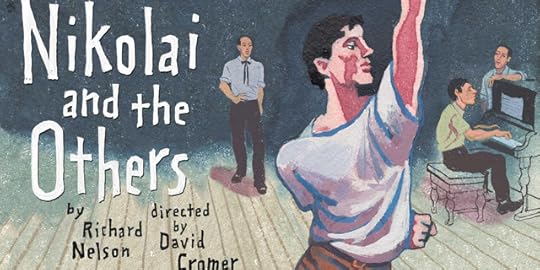
Nikolai and the Others, a play by Richard Nelson (published by Overlook Duckworth)
Nikolai and the Others is a new play written by Richard Nelson about a gathering of Russian emigrant artists at a place in the woods of Connecticut. The time is the spring of 1948.
The modernist composer Igor Stravinsky and the famous choreographer George Balanchine are working on a new ballet, Orpheus. Their compatriot friends, lovers, spouses, relatives are present at the house too; the only non-Russians there are an American called Chip and two young dancers, Nicholas and Maria.
The gathering is organised in honour of one of the guests, Sergey Sudeikin, a renowned but very much impoverished painter. Sudeikin is old beyond his years and frail, but his bitterness is lively. The Russians discuss Orpheus, politics in the world of culture, each other.
The play is named after a composer Nikolai Nabokov (N.B. not to confuse with the writer Vladimir Nabokov) who is, at the time of the fictional events described in the play, has got an office job, part of which is helping out the bohemian Russians like Stravinsky with visa and other emigration issues.
Nikolai, or Nicky, Nika, is greatly inspired by fragments of Orpheus, presented to the gathering, and thinking to resume composing. But his inspiration is wounded when he learns of certain opinions of the group on his talent.
The play definitely works better off page, as any play does, the music and choreography should make it a really unforgettable piece. The snake-pit relationships within the Russian expat community are the undercurrent in this play, but they further enhance the dramatic effect of the story of Orpheus and Eurydice.
I didn’t think the play showed any features specific to Russians apart from one: my people are very bad at containing their emotions or mean remarks.
The play is mostly dealing with materialism and if the theme of art has any room in the play at all, it is only in technical terms: the story of the myth, the dancing routine. The craft. Not the soul of art.
The only big art idea comes from Sudeikin’s speech:
Strip away everything else from a person, and the art is what you have left.
Perhaps, the point of the play is that geniuses are just like any other people. They have small problems in their lives too. They need to fit in. They need to be loved and understood, even if they come across as cold, distant and often behave like spoiled children. Let’s come up with an excuse that their venom is merely a by-product of their art.
May 12, 2014
The Science of Story-Telling: Eurovision and 50 Shades of Grey
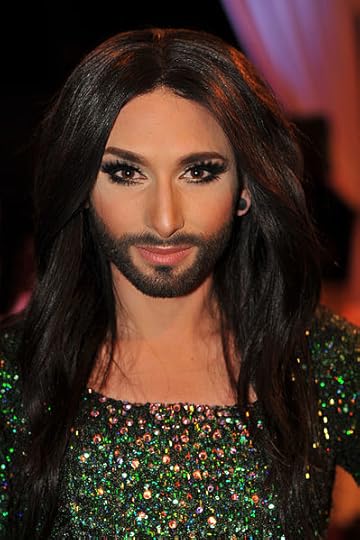
Eurovision 2014 Winner, Conchita Wurst (via Ailura, Wikimedia Commons)
Most of my blog’s audience live outside Europe. So, you wouldn’t necessarily know that Eurovision is the biggest song competition and one of the most popular annual cultural events in Europe. Each year’s a contestant represent their country in Eurovision and the winner’s country hosts next year’s show.
On the May 11th of this year, an Austrian act Conchita Wurst, in the scenic emploi of a bearded lady, won the Eurovision contest. Many argue that this victory is purely political and relates to Europe’s support of breaking gender stereotypes.
Here I suggest that one of the best songs has won the show and argue that the ingredients of the Eurovision success are the same of those of a best-selling novel.
Performing a song on stage is very much like telling a story. So what makes novels shine or slump and songs succeed or fail? The answer is emotional engagement.
But what makes us to engage with a novel or a song?
It’s an interesting character put in a great story. In a song, a character is an artist, the singer who channels the story through the singing. What is a plot in the song: first, it’s a story in the lyrics, and second it’s a melody that makes this story fly. A good melody that organically glues together the singer’s emotional performance and the song lyrics.
To make a better story, to evoke an emotion you need a conflict, a character should be overcoming an obstacle. A heartache that will not crush you but make you stronger is a common thing in pop music.
To summarise: a song works when it evokes emotion by means of an interesting character (a singer’s persona), lyrics and melody that tell a great story. But this is not enough. The second level is professionalism. Once the rough story is there, you need to edit it to perfection and present it like it’s a million dollar bill.
For a Eurovision hit, you need smashing vocals, relevant staging that fits the story and the relevant song arrangement that is either innovative or classy. The same applies to a novel: you need a great prose (that flows well, but not too sophisticated), thorough structural editing and proofreading done, and great cover and blurb .
In summary, your song’s or novel’s technical parameters should hone your creation into the new level. The more components you get right the bigger the probability of your song winning or your novel breaking through.
Now we can look at this year’s Eurovision winner and loser and see these components at work.
1st place:Conchita Wurst, Rise Like A Phoenix:
http://www.youtube.com/watch?v=_dCP-56Ps58
Persona: stands out (a cross-dressing act, a bearded woman).
Song: a classy JamesBond-esque tune, tells a story of a character prevailing over massive shortcomings.
Presentation: minimal classy staging, all focus on the persona; song tune and arrangement that are not unique but classy. Vocals – outstanding, not just technically, but they carry the emotional weight of the story. Conchita was one of the few acts not using back vocalists at all.
Overall: a classy emotional song, outstanding vocals and a persona that attracted a lot of media attention.
Last place:Twin Twin (France) – Moustache:
http://www.youtube.com/watch?v=vjkqciwP034
Persona: an urban pop dance trio, very happy and cheerful, very extravagant. But not unique, since a similarly extravagant acts are also in the competition. Eurovision is a bit like a circus, everyone needs to stand out. But it’s important how you stand out. And, in case of Twin Twin – what does their image mean? It is all over the place.
Song: it is about moustache. Movember came early? Hardly evokes emotions other than just a happy dancing. We don’t get the story though. The music and the lyrics are just quirky and about moustache envy I guess?
Presentation: great, colourful staging and dancing. Modern song arrangement, could see this song doing well in night clubs. But the live vocals are poor. This track would sound much better when recorded and properly mastered.
Overall: an interesting persona with no clear image, the song is happy but doesn’t tell a great story, weak vocals that further undermine the song’s effort.
As you can see, the first and last place are no brainer. What about acts in the top ten?
Sweden and Netherlands have their songs in the top 3. In terms of presentation, song quality, story and persona they almost nailed it. So what are their short-comings?
http://www.youtube.com/watch?v=OSw9UoiB92w
The Dutch song is rather relaxing and feels good, but not so emotionally charged. Their persona is an attractive middle-age couple in love, a very popular image, but far from unique. Mind you, in the absence of a competition like Conchita they could have won as easily as the similar couple from Azerbaijan did several years ago.
The runner-up from Sweden came up with a powerful emotional song with a great story and melody, very catchy. It’s a bit dated and repetitive with a key change in the end. The persona is an attractive singer portraying a fighter-character. Fantastic presentation. Acts like this won last couple of years, Denmark and Sweden again. So, the Eurovision audience simply wanted a change in my opinion.
Overall, I think any of the top 10 songs are strong contenders to win in another year. Additional parameters for song and novel successes are current fashions and political climate. For instance, this year’s Russian song entry scored high in my opinion in terms of persona, song, presentation, but didn’t receive many votes because of the country’s bad political image.
How does all this relate to a novel’s success?
All the attributes outside your story is your branding. If something damages your branding, then even the best story will flop. Alternatively, a great branding of a very mediocre story may shoot it into bestseller lists.
Take the 50 Shades of Grey trilogy.
Persona: a BDSM-loving billionaire bloke (reader’s dream) and a college girl (reader’s self-image)
Story: not great, but a troubled relationship between Christian and Anastasia sparks emotion in readers.
Presentation: many commented on the poor prose, but it’s highly accessible to mass-readers and reads like a soap opera. Branding is great – like it’s a some sort of a legal thriller rather than erotica, so it’s less shameful to carry the book in public. Also, the minimalistic cover easily attracts attention. The media label of it as ‘mommy porn’ and the media hype has helped this book to rise above similar novels.
However, the 50 Shades hype is short-lived compared to other bestseller analogues because several crucial components are missing here:
not a great story and prose
the characters lack sufficient depth or not representative of our time sociotypes to become cultural memes.
In comparison, The Bridget Jones Diary trilogy is more likely to enjoy long-term popularity because of the great story, a relatable yet standing-out persona, quality prose and emotional engagement.
The best-seller novel ingredients are:
an interesting character with depth and a problem realised in a fascinating plot, all of them causing our emotional engagement and resulting in a strong word-of-mouth;
good-quality prose (not primitive, not complex);
a brand (an author or a story) causing media disruption (an intriguing character (Suskind’s The Perfume, Larsson’s The Girl with a dragon Tattoo) or a setting (Rowling’s Hogwarts, Howey’s Silo) or a theme (women rights,The Millemium trilogy))
presentation (thorough editing, great blurb, book cover)
Get this right, then invest in publicising and the success is yours.
April 16, 2014
Viruses – A friend or a Foe? Out in the Ocean

the ocean is full of known and undiscovered viruses
VIRUS (Latin) – POISON
‘Virus’ is one of the most negative words. When we hear it we think about a computer virus or an agent causing a disease. AIDS and HIV, hepatitis and HBV,HCV,HDV,etc.
Biological viruses are tiny mobile pieces of genetic machinery, infectious chromosomes if you like. They are not organisms (though recently discovered giant viruses may change this notion). Viruses are molecular devices, only able to propagate within cells they infect. They transfer genetic information in the form of nucleic acids (DNA or RNA) from one cell to another, from one organism to another, not forgetting to copy itself as much as the host cell would tolerate it. Virus infection often creates a severe disturbance in a cell metabolism, causing a disease or, in many cases, death.
Until recently, virology has been tightly linked to genetics and pathology. But now it constitutes a significant part of ecology as well. Especially in the ocean.
One milliliter of sea water contains between one and ten million of viral particles per milliliter.How awesome is that. The Suttle lab also tells you that
The estimated 1030 viruses in the ocean, if stretched end-to-end, would span farther than the nearest 60 galaxies.
Most of these viruses infect micro-plankton (and nanoplankton) – microscopical bacteria and algae. In the past, macro-plankton like ciliates, rotifers and tiny arthropods were considered to regulate the biomass of the micro-plankton, preventing the overgrowth of bacteria or algae that can be quite toxic for other organisms. Recently, it has been shown that sea viruses infect and destroy the huge bulk of micro-plankton. The released organic matter either goes into the sediment or stays in the water and is consumed by other organisms and/or turned into inorganic matter.
Viral regulatory impacts are not to be underestimated. Virus infection limits over-expansion of certain microscopical mechanisms and is therefore important for homeostasis (equilibrium) in marine environment.
Dr Curtis Suttle talks on importance of marine virology
http://www.youtube.com/watch?v=oi4B98u4hJ4
Some marine cells like cyanobacteria (blue green algae) and dinophyte algae produce highly toxic compounds for humans and other animals. Viruses that destroy them are therefore beneficial to prevent the accumulation of toxins and their producers in the sea water.
In my new novel Made in Bionia, there’s a bioterrorist plot to poison the ocean, which exemplifies how messing with micro-plankton and viruses can trigger an ecological catastrophe. I aimed to show that tiny things can have a huge planetary impact and become a dangerous weapon in the wrong hands as well as a cure in the right.
For too long, the micro-cosmos of the ocean has been ignored by ocean biologists. But with the advent of high-throughout sequencing many more microscopical lifeforms have been discovered, including new viruses, and marine virology and viral ecology are new exciting disciplines. And they are changing our view of viruses as not just infectious agents causing disease but a major force that regulates the well-being of ecosystems.
p.s. Easter is coming and I have a great promo with Story Cartel: in the next 20 days you can download Made in Bionia for free in exchange of an honest review. I would very much appreciate your feedback on it as I have started working on the second book and I may take it into account your suggestions.
April 14, 2014
London Book Fair: ReadRussia and Indie Power
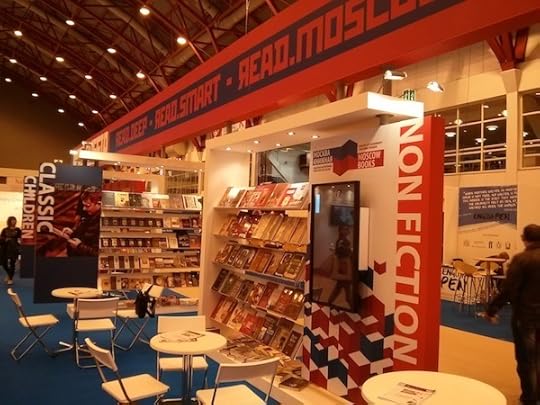
The ReadRussia stand at the London Book Fair 2014
Last week I visited London Book Fair and helped running the Russian stand called ReadRussia. This year Moscow was a guest city at the fair, and a big part of the exhibition at the stand were books about Moscow.
There was a strong interest amongst visitors in the Russian illustrated and children book industry. International publishers were asking for contact details of their Russian colleagues. Some wanted to distribute Russian books outside Russia (like Ingram), others wanted to get their books translated and published in Russia. With the population size of UK and Germany put together Russia is a lucrative book market. While in the UK the market share of international (non-US and non-UK) books is tiny, in Russia it is about half of the market, yeah, it is nothing to sneeze at.
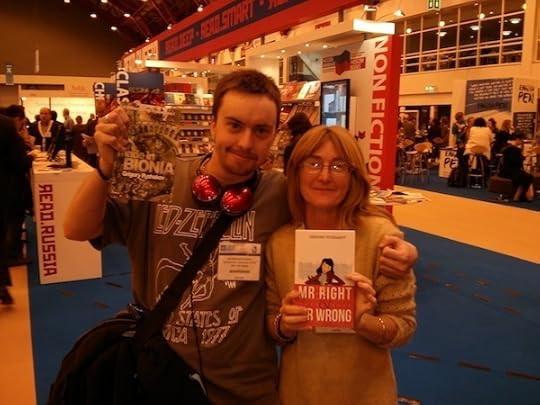
Benj and Stephanie Dagg from edit-my-book.com , my fantastic editors
I was lucky to present my new novel Made in Bionia at the stand and I have even met my lovely editor Stephanie for the first time in person.
My time at the ReadRussia stand was well spent: several publishers, including Mongolian and Chinese, expressed their interests in my books. I have a pocket-full of business cards and am now busy following things up. Bear with me.
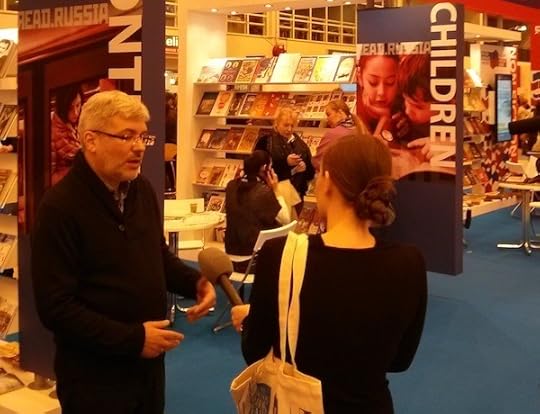
Author of “The Laurel”, the Russian writer Evgeny Vodolazkin is being interviewed at the Russian stand
The greatest highlight of the stand this year was a huge number of Russian books coming out in English translation, thanks to the Institute of Translation for its enormous support of writers and translators and the publishing house Glagoslav.
Several Russian writers arrived at the fair to present their books. I was honoured to interpret the interview of Pavel Basinsky with Viv Groskop on his new book Leo Tolstoy. Flight from Paradise at the PEN literary salon, which was based next to the Russian stand.
If you are one of the visitors whom I met and I somehow forgot to follow up your request, please remind me about that. I’m still a little overwhelmed with the possibilities at the fair. Too little time to deal with all that.
Aside from ReadRussia, I have attended talks at the AuthorHQ pavilion where tradpub and indie authors gathered to get filled in on the zeitgeist of the publishing industry.

Thinktank: Best-selling indie authors (Jasinda Wilder, Liliana Hart, Barbara Freethy, Bella Andre and Jack Wilder) giving away secrets of their success
There I have met indie author-celebrities who were very generous to share their methods of publishing and marketing. With so much knowledge and passion they’ve shown I can understand why they are so successful.

The Silo Saga creator and the indie revolution leader Hugh Howey and the happy me
Yet again I was likened to a comic superhero alter ego. I must practice wall-climbing from now on.
The moment @hughhowey realised @GrigoryRyzhakov IS Spiderman… @BenGalley #LAF14 pic.twitter.com/BFOBYhzuHS
— Polly Courtney (@PollyCourtney) April 9, 2014
Amazon KDP kindly sponsored the annual piss-up author networking event at the King’s Head pub, where Orna Ross and other authors celebrated ALLI’s second birthday by reading excerpts from their books. I didn’t know Orna wrote such brilliant poems.
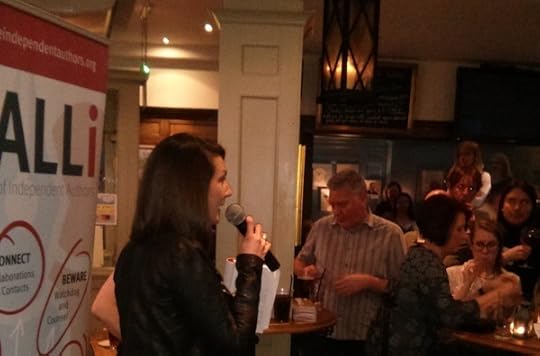
The UK indie author, Polly Courtney, is reading an excerpt at ALLI/Amazon’s event
So, London Book Fair was a smashing success for me. I have launched my satirical techno-thriller, Made In Bionia, and now you can get it on Amazon both in print and digital. Please spread the word about it: even if you are not a fan of this genre, your friends could well be.
http://www.youtube.com/watch?v=R6rhOS9ogEo


